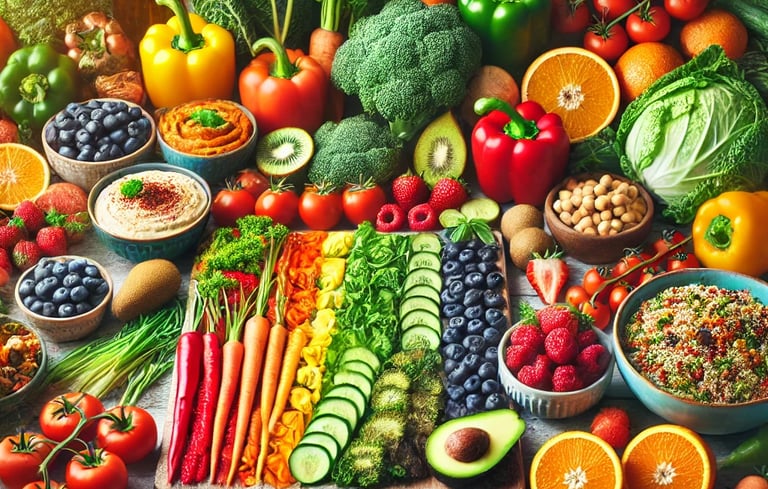Join Our Community & Get Your Free Health Starter Kit
Discover the Health Benefits of Mushrooms: Why Eat More!
Mushrooms are nutrient-packed powerhouses with ancient roots in medicine and wellness. Learn about the health benefits of mushrooms, including brain-boosting varieties, and how to incorporate them into your meals for a delicious and nutritious boost.
8/31/2025
In recent years, there’s been a significant shift in how people think about food. Whether it’s for health, environmental reasons, or animal welfare, plant-based diets and alternative proteins are quickly becoming mainstream. But are they really better for us—and the world? Let’s dig into the research and hear from real people who’ve made the switch.
What Is a Plant-Based Diet?
A plant-based diet focuses on foods primarily from plants: fruits, vegetables, whole grains, legumes, nuts, and seeds. This doesn't necessarily mean being vegetarian or vegan. Many people follow a flexitarian lifestyle—primarily plant-based but occasionally including meat or fish.
Backed by Science: The Health Benefits
1. Lower Risk of Chronic Diseases
A large-scale study published in the Journal of the American Heart Association (2019) found that people who ate more plant-based foods and fewer animal products had a 32% lower risk of heart disease.
Another meta-analysis in JAMA Internal Medicine (2016) reviewed multiple studies and found that vegetarian diets were linked to lower blood pressure, cholesterol, and reduced risk of Type 2 diabetes.
Research Insight: A Harvard study that tracked over 200,000 participants for more than 20 years concluded that plant-based diets rich in whole foods were associated with lower mortality rates.
The Rise of Alternative Proteins
What are they?
Alternative proteins include plant-based meats (like Beyond Meat or Impossible Burger), insect proteins, lab-grown meats, and fermented protein products like mycoprotein (used in Quorn).
According to a 2021 report by the Good Food Institute, the global plant-based meat market exceeded $5 billion in 2020 and is projected to keep growing rapidly.
Why choose them?
Lower environmental impact: A 2018 Oxford University study found that producing plant-based meat alternatives results in 90% fewer greenhouse gas emissions than beef.
Animal welfare: No animals are harmed in the making of these products.
Food security: Alternative proteins require fewer resources, making them more sustainable long term.
Real-Life Testimonials
Jasmine, 38, Nurse from California
"I started a plant-based diet after experiencing fatigue and digestive issues. Within two weeks, I felt more energized and my skin cleared up. My doctor was amazed at how my cholesterol dropped in just three months!"
Michael, 45, Father of Two
"I used to be skeptical of veggie burgers, but once I tried the Impossible Burger, I was hooked. Now we do ‘Meatless Mondays’ with the kids—and they love it. It’s our little family contribution to the planet."
Dr. Raj Patel, Plant-Based Nutritionist
"Over the years, I've seen patients reverse pre-diabetes, lose weight sustainably, and even reduce joint inflammation—just by incorporating more plants and cutting back on processed meats."
Is It for Everyone?
While plant-based diets can be incredibly beneficial, they must be well-planned to include enough vitamin B12, iron, omega-3s, and protein. That’s where alternative proteins and fortified plant foods come in handy.
Tips for Getting Started:
· Begin with one plant-based meal a day.
· Try meatless Mondays.
· Explore legumes, tofu, tempeh, and plant-based protein powders.
· Read labels—not all plant-based foods are healthy (watch out for added sodium and sugars).
Switching to a plant-based lifestyle or incorporating more alternative proteins doesn’t have to be all-or-nothing. Even a few changes each week can boost your health, reduce your carbon footprint, and contribute to a more sustainable future.
Whether you're motivated by wellness, the environment, or simply trying new flavors, there’s never been a better time to explore the world of plant-based eating.


